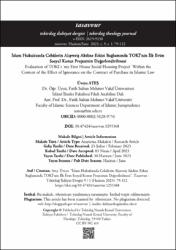İslam Hukukunda Cehâletin Alışveriş Akdine Etkisi Bağlamında TOKİ’nin İlk Evim Sosyal Konut Projesinin Değerlendirilmesi
Citation
ATEŞ, Üveys. "İslam Hukukunda Cehâletin Alışveriş Akdine Etkisi Bağlamında TOKİ’nin İlk Evim Sosyal Konut Projesinin Değerlendirilmesi." Tasavvur / Tekirdağ İlahiyat Dergisi,9.1 (2023): 79-112.Abstract
Fıkhî bir terim olarak hukuki işlemlerdeki belirsizlikleri ifade eden cehâlet kavramı, İslam hukukunda akitlerin meşruiyetine olumsuz etkisi bulunan bir durum olarak kabul edilmektedir. Alım satım işlemlerinde karşılıklı rıza esa-sının zedelenmemesi ve taraflar arasında çekişme yaşanmaması için satılan mal, karşılığında ödenecek bedel, satış vadeli ise bedelin teslim zamanı, taksit sayısı vb. hususların akit sırasında netleştirilmesi yapılan alışverişlerin sıhhati için şart görülmektedir. Bununla birlikte her belirsizlik akdin sıhhatine engel sayılmamakta, çekişmeye götürecek boyutta olmayan küçük belirsizlikler mü-samahayla karşılanmaktadır. Dört mezhebin de fıkıh kaynaklarında bu du-ruma örnek teşkil eden çok sayıda mesele yer almaktadır. Bu çalışmada önce-likle İslam hukukunda cehâletin alışveriş akitlerinin sıhhatine etkisi klasik fıkıh kaynaklarında yer verilen meseleler üzerinden incelenmekte, daha sonra bu bağlamda TOKİ’nin ilk evim sosyal konut projesinin içerdiği konut satış sözleşmesi fıkhî yönden analiz edilmektedir. Ayrıca projenin toplumun önem-li bir ihtiyacını karşılama ve maslahatı gerçekleştirme yönü dikkate alınarak söz konusu konut satış sözleşmesi istihsan yöntemi açısından da analiz edil-mekte, mesele fıkhî açıdan değerlendirilirken kamu yararı göz ardı edilerek “cehâlet akdi fâsid kılar” kuralının mutlak ve katı biçimde yorumlanmasının isabetli sonuçlar doğurmayacağı üzerinde durulmaktadır. As a fiqh (Islamic jurisprudence) term, the concept of “ignorance” ex-presses uncertainties in legal transactions and, in Islamic law, is accepted as a situation that negatively impacts the legitimacy of contracts. If the sale is de-ferred, clarification of the delivery time of the price to be paid for the goods sold, the number of installments, etc. during the contract is considered essen-tial for the validity of the transactions in order not to damage the principle of mutual consent in purchase and sale transactions and to avoid conflicts be-tween the parties. However, not every uncertainty is considered an obstacle to the validity of the contract, and minor uncertainties that do not lead to dis-putes are tolerated. The fiqh sources of four Islamic sects contain many exam-ples of these uncertainties. This study firstly examines the effect of ignorance on the validity of purchasing contracts in Islamic law using the issues in clas-sical fiqh sources and then analyses the housing sales contract of TOKI’s (hous-ing development administration of Turkey) “my first house social housing project” in this context from a fiqh perspective. In addition, the study address-es the related housing sales contract in terms of the juristic preference method by considering the aspect of meeting an important need of society and realiz-ing the purpose of this project. Then, while evaluating the issue from a juris-prudential point of view, the study discusses that the absolute and strict in-terpretation of the rule of “ignorance renders the contract void,” which is adopted by ignoring the public interest, does not produce favorable results.



















